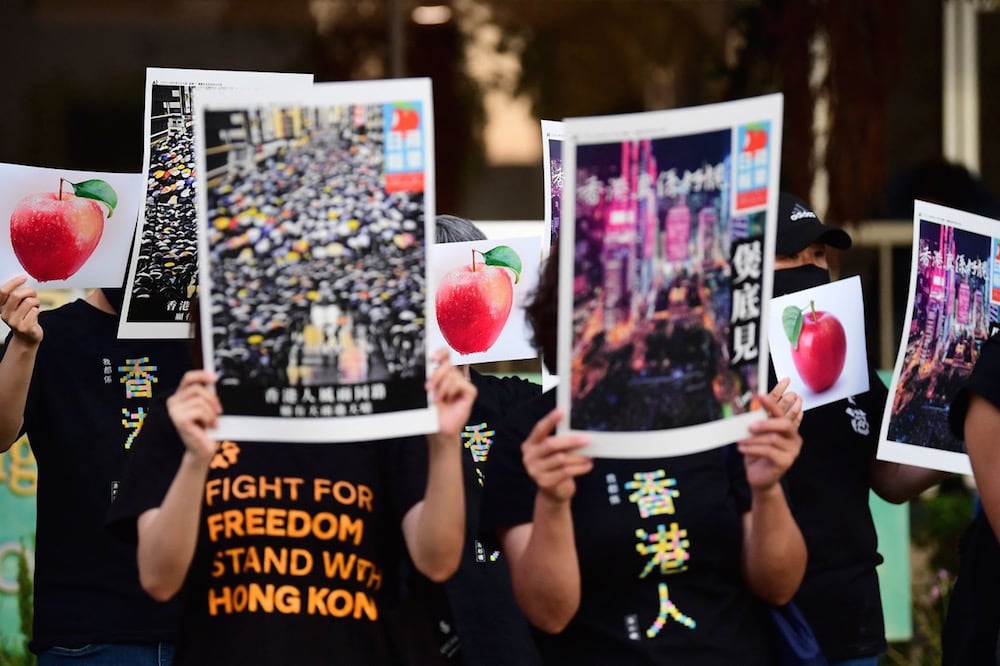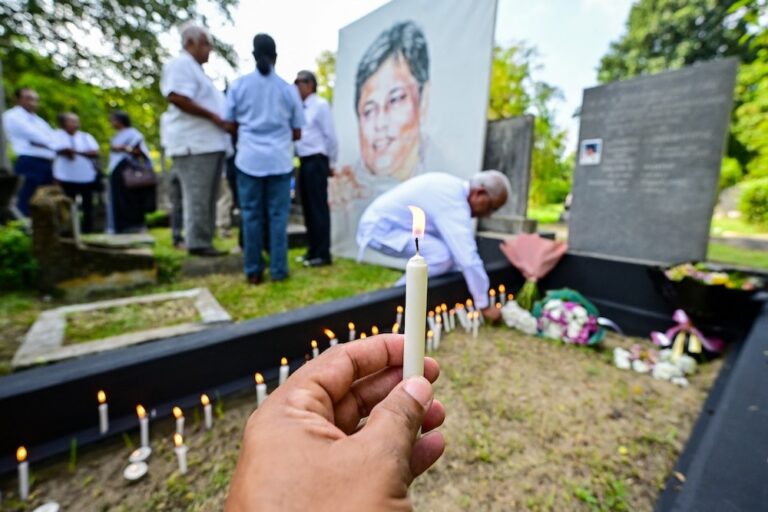June 2021 in Asia-Pacific: A free expression round up produced by IFEX's regional editor Mong Palatino, based on IFEX member reports and news from the region.
The closure of a pro-democracy newspaper after it was raided by the police signals the demise of press freedom in Hong Kong. Pakistani media are alarmed over attacks targeting journalists. Several investigative journalists and Twitter were charged by Indian authorities over a viral video.
Raids, arrests, and a newspaper closure in Hong Kong
The month of June started with Hong Kong authorities banning any activity commemorating the 1989 Tiananmen massacre, and it ended with news about the closure of independent newspaper Apple Daily.
Around 500 police officers raided the office of Apple Daily on 17 June. Five editors and staff were charged under the National Security Law for ‘colluding with foreign forces’. Apple Daily ceased print and digital operations a week after its assets were frozen by the government. Its founder Jimmy Lai was arrested in August 2020 and sentenced this year for his alleged role in organizing pro-democracy protests in 2019.
Chris Yeung, the former chairperson of IFEX member Hong Kong Journalists Association, wrote about the impact of the raid and arrests. “The swiftness and ruthlessness of the use of harsh laws and powers have caught many by surprise.”
Media groups warned about its chilling effect on society. “People will feel unsafe, uneasy talking to the media. Self-censorship will get worse if journalists are not sure whether they are able to protect their sources.”
HKJA expressed concern over the closure of Apple Daily. “The HKJA expresses anger and pain for the loss of this much valued multi-media press group that had long been pursuing and defending journalism.”
Freedom House noted that the crackdown on Apple Daily reflects a wider assault on freedom of expression in Hong Kong. “Treating independent, fact-based journalism as a threat to national security is an unacceptable attack on press freedom and comes amid a wider crackdown on freedom of expression and freedom of assembly in Hong Kong.”
As authorities intensify their clampdown on dissenting voices, defiant Hong Kong citizens are pushing back. Some managed to organize symbolic activities commemorating the Tiananmen massacre, overseas activists celebrated the second year anniversary of the 2019 pro-democracy protests on 12 June, and thousands lined up to buy copies of Apple Daily. HKJA also initiated a social media campaign using the hashtag #InSupportofJournalists to assert the need for independent media.
Attacks against Pakistan media
Pakistani media groups have rejected the proposal to create a Pakistan Media Development Authority which would centralize all media regulatory structures and create a ‘converged’ regulatory authority. They warned that it “is nothing less than imposing media martial law”. IFEX member Pakistan Press Foundation (PPF) added that the proposal will grant the authorities tools to further control the media narrative and undermine the media’s ability to provide free and independent coverage.
Media groups are also alarmed over the spate of attacks targeting journalists. On 20 April, former Pakistan Electronic Media Regulatory Authority chairman Absar Alam survived an assassination attempt in the country’s capital, Islamabad. The following month, journalist and blogger Asad Ali Toor was attacked inside his apartment. Popular anchor and journalist Hamid Mir was removed from his Geo News show after he expressed solidarity and condemned ‘non-democratic forces’ which instigated the attacks against journalists.
PPF urged authorities to probe the attacks and protect journalists. “Ensuring that impunity is not given to perpetrators of such attacks is essential and we urge the authorities to ensure that these cases are investigated.”
Curtailing free speech in India
IFEX member SFLC.in has compiled cases of free speech violations in India during the pandemic. It monitored three trends: website and application blocking, content takedown orders under Section 79 and Section 69A of the Information Technology Act, and imposing criminal liability by using laws on sedition, defamation, and hate speech.
India’s new Information Technology Rules took effect last month and immediately became a contentious issue involving tech companies. It accused Twitter of failing to comply with the rules and for tagging the tweets of some members of the ruling party as ‘manipulated media’.
A case was also filed against Twitter regarding a viral video that allegedly contains misinformation. Three other journalists and investigative media outlet The Wire were also slapped with a criminal conspiracy case after tweeting a video of an elderly man who was being assaulted. The charges against the journalists include provocation to cause riot, promoting enmity between religious groups, and insulting religious beliefs.
The filing of arbitrary cases against critical journalists has intensified in recent months. For example, journalist Siddique Kappan was arrested in October 2020 on a breach of peace charge. But on June 16, Uttar Pradesh’s Mathura district court dismissed the case, citing failure of the police to properly investigate the supposed crime. He remains in detention because new charges of sedition, rioting, and criminal conspiracy, as well as under the Unlawful Activities Prevention Act, were filed against him in April.
Journalists face other threats for doing their work. Sulabh Srivastava of ABP News mysteriously died in a road accident after he asked for police protection against a local liquor mafia in Uttar Pradesh, which he earlier exposed in his reports. Media groups have already asked the government to investigate this incident.
Violence against women
In Papua New Guinea, at least five women have been attacked since March 2021, one of whom was killed, after being accused of practicing sorcery. The women were blamed for some deaths and illnesses in the community which could be related to the surge of COVID-19 cases in the country. Stephanie McLennan of Human Rights Watch said “authorities should act swiftly and effectively to correct misinformation about deaths from COVID-19 to prevent more sorcery accusations and attacks.”
Ariana News anchor Mina Khairi was killed in an IED (improvised explosive device) blast on 3 June. She is the fifth journalist and media worker to be killed in 2021 in Afghanistan.
In South Korea, a new report featuring interviews with survivors of digital sex crimes highlights the obstacles faced by victims in pursuing justice. “Survivors are forced to deal with these crimes for the rest of their lives – with little assistance from the legal system,” wrote Heather Barr, interim co-director of women’s rights at Human Rights Watch.
The crackdown on anti-coup protesters in Myanmar also included women activists who narrated the abuse they suffered in prison. Daw Ei Thinzar Maun provided additional information in a report published by Burma News International: “The women who had been improperly detained have faced verbal attack, sexual violence or severe beatings during interrogation. One pregnant lady has had a miscarriage after being beaten severely by security forces.”
Alert about new repressive laws and regulations
Around 25 groups have sent a letter to Indonesia’s Minister of Communication and Information Technology to express human rights concerns about Ministerial Regulation 5 (MR5), which was passed in December 2020. It was supposed to take effect last month, but was postponed for six months. Critics said MR5, which governs the functioning of private electronic systems operators, contains regulations that could undermine privacy and freedom of expression. Michael Caster of ARTICLE 19 has warned that MR5 will allow authorities “to bully online service operators into compliance under the threat of having their services or websites shutdown in Indonesia.”
Civil society groups in Southeast Asia are pushing back against the Laos government’s recent directives to monitor social media platforms and enforce internet registration. The Ministry of Public Security has created a special task force to monitor “illegal online media” and COVID-19 related “fake news” content, but human rights groups said that this is another reflection of the “digital dictatorship” in Laos.
ARTICLE 19 has released its legal analysis of Malaysia’s emergency ‘fake news’ ordinance which revives draconian provisions of a repealed 2018 law. It noted that the ordinance could prevent any criticism of the government’s COVID-19 response, as it provides virtual immunity for the government using it to silence dissent or suppress freedom of expression.
ARTICLE 19 also criticized the plan of the Thailand government to pass a new regulation intended to combat ‘fake news’. It pointed out that the new regulations under the Computer Crimes Act “would tighten governmental control over social media platforms and impose additional barriers to online expression.”
In March 2021, China added a new provision to its Criminal Law which prohibits the defamation of ‘heroes and martyrs’. Political commentator and former reporter Qiu Ziming became the first person sentenced under this new provision when he questioned the lack of transparency regarding a border clash between China and India a few months ago.



